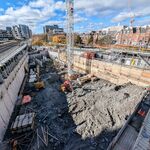picard102
Senior Member
Hopefully not. A larger airport means more jets, and Pearson makes enough noise already.
Hopefully not. A larger airport means more jets, and Pearson makes enough noise already.
I'm not sure how you're coming to these conclusions considering the real world examples point to just the opposite. Air Canada's feeder flights from Montreal and Ottawa are basically the same as a connecting flight from Lyon to de Gaulle in Paris...a market that has been nearly completely taken over by the TGV. Short haul flights to Brussels, London, Barcelona, and Madrid all declined rapidly after HSR service was introduced. The UK is planning the same thing for domestic flights with their High Speed 2 project.Transfer traffic won't be moving substantially to Pearson. Not without serious air-rail integration. Which is really unlikely to happen (since any rail project will target union station before all else). HSR may kill Porter's case for Ottawa and Montreal flights. But it won't do much to change the picture for Air Canada at Pearson. Air Canada's runs hourly flights to those cities so that it can feed Air Canada's long-haul network. It's not going to cut too many frequencies there. It'll just downgauge the size of aircraft, on account of less origin-destination traffic between Toronto and Ottawa/Montreal.
The best case for rail serving the airport is between Ottawa and Montreal-Dorval. There are already shuttle buses that leave from Ottawa's VIA station no less, that take international passengers for several airlines from Ottawa. Air traffic in Ottawa would be reduced a bit if HSR is established between Ottawa and Montreal.
Considering the TGV makes a profit and subsidizes the rest of the rail network in France, I'm not so sure about your claim that high speed rail is the reason that certain European countries have high taxes and debt. Ireland has a superior rail system to ours and it's famous for its low taxes. The reality is that these countries simply put a larger percentage of their infrastructure money into rail than we do (although that may be starting to change, at least in Ontario). National population densities aren't relevant, only the population densities in the areas where high speed rail would actually be built. The Windsor-Quebec corridor has the same population density as France and Spain. And while the Corridor has less than half the population of Spain, it also has much smaller HSR ambitions.Not too sure about this comparison with Europe for HSR. Higher national population densities. And those HSRs replaced a lot of short-haul turboprop flights. Other than Toronto-Ottawa and Toronto-Montreal, what's our market for say Ottawa-London or Toronto-Windsor? More importantly, governments in Europe and willing to take on insane amounts of debts to spend on all sorts of public programs and infrastructure. Would the Canadian public ever tolerate governments spending (and taxing) like what they do in Spain or France? Doubt it. That's why I'm skeptical about spending on the whole corridor. Best case scenario is that the Liberals commit to VIA's new corridor enhancement plan and we get regular, reliable and solid service. Some speed enhancements. And hopefully costs that make it more accessible and competitive with the bus.
Considering the TGV makes a profit and subsidizes the rest of the rail network in France, I'm not so sure about your claim that high speed rail is the reason that certain European countries have high taxes and debt.
The feeder flight ops are not the same in Europe and Canada. Air France has one hub. Air Canada has 4 international hubs and 3 secondary regional hubs. Air Canada will not be shuttling passengers by train to Pearson even with high speed rail. That said passengers may do some of that themselves. However, it just won't be enough for AC to be substantially curtailing regional feeder flying.
rbt covered the profitability situation well. Which is to say that it's lots of sketchy accounting.
Now, none of that means that HSR isn't justified or desired. But let's not make a pie-in-the-sky business case for it. Service to Ottawa in 3 hrs. And Montreal in 4 hrs. With good frequencies would still do quite well. It would steal from both buses and cars. And maybe even a little from flying.
But even if, for the sake of the argument, an HSR line doesn’t make a profit, would that be so bad? .
Almost all rural freeways have to be subsidized but that hasn’t stopped countless billions from being spent on them. It’s a clear double standard. Put it this way...which is a better use of money – a $2 billion freeway to Sudbury that will have limited use, be subsidized every year, and be inherently unsafe? Or a $3 billion high speed rail line to London which will benefit more people, increase safety and reliability over driving, reduce pollution, and potentially make a profit?
We can’t forget the indirect savings from high speed rail that aren’t accounted for in profits: reduced emissions, less need for highway expansion, fewer collisions on the roads, reduced economic costs from delayed flights and traffic jams, etc. These are all costs that are higher than they need to be because of the way we prioritize our transportation spending.
What you're describing isn't true HSR, it's more like what VIAFast was supposed to be.
For HSR, the 1990s study estimated that airlines would lose 44% of their passengers to HSR on short haul corridor routes. That's consistent with other HSR lines, conservative even. It's not "maybe a little", it's a huge shift in how people travel.
De Gaulle isn’t Air France’s only hub, it has six of them including secondary hubs throughout France. Regardless of how many hubs Air Canada has, there are loads of flights coming in from Ottawa, Montreal, and even London. You keep saying that Air Canada would just keep flying feeder routes, but it isn’t really Air Canada’s choice. Travellers have shown a clear preference for high speed rail over flying (and driving) where it’s an option and there’s no reason to think that Canadians would be any different. With an HSR system, airlines can either adapt and offer partnerships with rail or lose massive business. It’s pretty tough to keep planes in the air when all your customers are taking the train.
Pearson makes enough noise already.
You haven't noticed the noise under the flight path in Western Mississauga? Hard to hold a conversation at times near Erin Mills/Brittannia.What does that even mean? Pearson is too noisy? What???
I've had to stop speaking and wait for the plane to pass overhead. When it's directly overhead on approach to runway 6R or 6L (whichever it is that lines them up near that intersection). Never heard anything that loud downtown - though you do hear a bit at Cherry Beach on approach.Not true.
I've had to stop speaking and wait for the plane to pass overhead. When it's directly overhead on approach to runway 6R or 6L.
Well, I think it's landing ... honestly, I'm inside, at the frigging dinner table, trying to talk to in-laws ... with all the windows open - I'm not heading outside to see which way the bloody plane is heading.Don't believe you. Especially not on landing. If you had said on take off, maybe. I'm out at the airport around that area once or twice a week. No issues with not being able to talk while planes pass overhead at all. None whatsoever.




